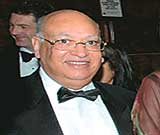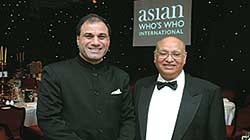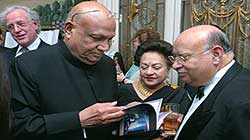 Building Bridges: Diaspora Philanthropy Building Bridges: Diaspora Philanthropy
Ever since Indians left for distant shores 2500 years ago, bridges have existed between them and the motherland. These bridges not only require funds but also new systems, knowledge, technology and expertise with which the PIOs have succeeded abroad
What is Philanthropy?
As we all know, philanthropy is giving back to society for some worthwhile causes. Though so many say they “give back”, rarely has anyone tried to explain precisely what the phrase “give back” means. Note the two words. Those advocating, “giving back” are not merely saying that a successful individual should give to society out of generosity. They are saying he should give back according to the noble code of earning one’s money and paying one’s debts.
 When you follow this line of reasoning, the consequences for the donor are not simple. If your philanthropic action is “giving back”, how much are you withholding that you have not yet given back. When should we expect to see you give back the rest of the money that you have earned through your efforts and hard work? Of course, in the real world successful people are frequently benevolent and generous. The most common scenario is that their achievements result in the creation of wealth that did not exist previously. A common reason for using the phrase “giving back” is the desire to appear modest and unpretentious. Undoubtedly, many wealthy donors are advised that giving back is a polite way to avoid looking arrogant. When you follow this line of reasoning, the consequences for the donor are not simple. If your philanthropic action is “giving back”, how much are you withholding that you have not yet given back. When should we expect to see you give back the rest of the money that you have earned through your efforts and hard work? Of course, in the real world successful people are frequently benevolent and generous. The most common scenario is that their achievements result in the creation of wealth that did not exist previously. A common reason for using the phrase “giving back” is the desire to appear modest and unpretentious. Undoubtedly, many wealthy donors are advised that giving back is a polite way to avoid looking arrogant.
In my opinion, I would like to see generous people explain their philanthropy in honest forthright terms, refrain from using “giving back” and to describe philanthropy, replace it with something like “I am glad that I am able to contribute to this important cause”. Giving should be a way of life rather than an obligation or responsibility.
Ever since Indians ventured abroad over 2,500 years ago to distant shores in South East Asia, the Far East, and East Africa; over 150 years ago to South Africa and the Caribbean; and 60 years ago to Britain, Canada and the US; firm and bridges have always existed between them and their motherland. Today, these bridges need to be upgraded, re-designed and reinforced for the 21st century. These bridges not only require funds but also new systems, knowledge, technology and expertise with which the PIOs have succeeded abroad.
 In my opinion Mahatma Gandhi was the most inspirational philanthropist born in India even though his philanthropy did not involve providing material support to the disadvantaged in society. In my opinion Mahatma Gandhi was the most inspirational philanthropist born in India even though his philanthropy did not involve providing material support to the disadvantaged in society.
Today, we have over 25 million PIOs living in about 130 countries outside India. PIOs have worked hard in their adopted countries and achieved success in many fields, mostly in business and the professions. But they have also distinguished themselves in politics, science, economics, literature, cinema, the arts and almost all fields of human endeavour.
In some cases their success has been outstanding. For example that of Nobel Prize winners such as professor Amartya Sen and V.S. Naipaul. Outstanding scientists such as Dr Har Gobind Khorana and Dr Abraham Verghese. Businessmen such as Mittal Steel’s L.N. Mittal, Lord Swraj Paul and Lord Karan Billimoria and in entertainment Ravi Shankar and Gurinder Chadha. Politicians like Lord Dholakia have succeeded in becoming president of a major political party in the UK—the Liberal Democratic Party. Likewise, we have Ruby Dhall, a Punjabi girl, who has become the youngest Member of Parliament in Canada.
To encourage greater traffic over this bridge of philanthropy, the Government of India needs to become more ‘pro-active’ on the ground and not in statements and speeches at conventions such as this, or, during visits by Indian leaders abroad. Among the issues they require to be addressed are: reducing red tape to a minimum by eliminating ‘the license raj’ that still reigns supreme at the state and district level; allowing PIO professionals like doctors and dentists to work in India; greater on-line interaction with PIOs and speedy responses to their requests and, finally, an understanding of the mindset and intentions of PIOs in their endeavours to assist India.
For example, PIOs can assist India’s star athlete present here, such as P.T. Usha, to expand athletics training so that Indians can garner more medals in the Commonwealth Games next year; Mr Kashi Rao to provide inputs for upgrading some rural educational institutions to Canadian standards and certification; inter-act with Prof. Chetty for greater academic interaction between South Africa and India.
PIOs are ready to bridge ‘the Income Gap’ between India’s rich and poor and alleviate poverty, ignorance and disease in India by donating funds, technology and training, professional expertise and, most of all, their time. PIOs need a more enabling atmosphere with a modern, wider and stronger bridge for this effort and they are ready to cross this bridge.
Philanthropy is very close to my heart. Ten years ago I, along with my family, set up a trust, named after my late mother Shrimati Pushpawati Loomba. Although the Loomba Trust started its core work in India, we are now working in 11 countries around the world. The United Nations accredited the Loomba Trust as a UN NGO on 30 June, 2008.
The task of covering every state in India—from Kashmir to Kerala and from Gujarat to the North East is a very onerous one. Many global NGOs and multinational aid organisations are not working in every state of India. The trust has taken on this challenge and has succeeded.
The Loomba Trust is currently educating over 3600 children of poor widows in India and supporting their mothers to live a life of dignity. As part of its global work, it is supporting a community building project for 1500 HIV orphans in South Africa, in partnership with Virgin Unite, Richard Branson’s charity. The trust has become a global Partner with the Prince of Wales’ charity, Youth Business International, and has launched the Loomba Entrepreneur Programmes to empower young widows by setting up businesses for them in Uganda, Kenya, Bangladesh, Sri Lanka, Nepal, Syria and Columbia. We will be launching a new project to support 600 genocide widows in Rwanda later this year.
As we all know, education is important for all children regardless of their gender, religion, colour or creed. It is their birth right. Yet, in India, not hundreds, not thousands, but millions of children do not have the fortune to receive education in their life. According to statistics, there are millions of children who are out of school in India. And it is a national problem. I am certain that many overseas Indian organisations and PIOs will be keen to work with the India Development Foundation to help such worthy causes.
The objective of The Loomba Trust is to spread its work in educating the children of poor widows throughout the country, and in the process become one of India’s few truly national charitable organisations and in the course of its work to inspire others to think and develop along national rather than local and provincial levels.
The Loomba Trust certainly cannot address the whole problem alone. We hope to establish modules for other people to join us with to expand our work. We are eager to encourage organisations throughout the world, the governments of India and all India-friendly countries to join with us in raising the profile and importance of not only education for all, but an education that augments an individual’s life chances and developmental progress. I am confident we will be able to achieve our objectives and aims through an association with the India Development Trust. A great way of Building Bridges between the Loomba Trust and the disadvantaged, deprived and ignored sector of widows and their children in India.
Thank you. |